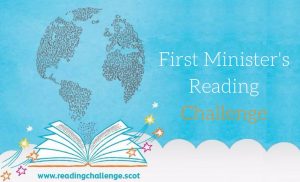First Ministers Reading Challenge at Cornbank Primary School
 What is the First Minister’s Reading Challenge?
What is the First Minister’s Reading Challenge?
The First Minister’s Reading Challenge is a programme for Primary 1 – 7 pupils in Scotland, providing opportunities and resources to help them develop a love of reading.
We hope to encourage children to go on their own reading journeys, explore different types of books and celebrate personal reading achievements.
The First Minister’s Reading Challenge will run at Cornbank from January until May 2018 and we will be encouraging our learners to read as often as possible and promote a love of reading across our school.
Why is it Important?
The importance developing a life-long love for reading cannot be underestimated for children and the impact it has on all aspects of education – the curriculum and beyond – is immeasurable. Allowing children to enjoy the fun and pleasure of reading by developing a reading culture in schools, communities and families is therefore incredibly worth-while and something which lies at the heart of the First Minister’s Reading Challenge.
What can you do to help?
Helping children to fall in love with reading at home is just as important as what goes on at school. There are many ways you can encourage your children to develop the reading habit and support them throughout the First Minister’s Reading Challenge.
Children will be more excited about reading if they can choose materials related to their interests. Encourage them to try out new types of books and magazines too. Give your child the chance to discover what they like to read.
If you are looking for recommendations to get your children hooked on books, you will be able to browse ‘Places to Start Your Reading Journey’ on the website, a collection of carefully selected children’s books. The collection represents a wide range of children’s books, including non-fiction, poetry and graphic novels. The titles have been selected by a panel of experts, including teachers, librarians and booksellers, and are intended to inspire you and your children to get involved. They are split into different categories and you can filter them by age, genre and rating.
The titles, however, are not mandatory reading, nor are children required to read them in order to take part in any aspect of the Reading Challenge. All reading is good reading and we encourage children to choose titles which they enjoy. We hope our collection sparks imaginations!
Furthermore, a fantastic resource in your community is your local library. Visit the library regularly and let your child choose their own book. Encourage them to talk to their librarian about their choices, ask them for recommendations and use their own library card.
Reading aloud to your children doesn’t need to stop when they get older and, as long as it’s something you both enjoy, it’s a great way to appreciate a good story together. Even if your child prefers to read on their own, take time to chat about what they are reading. It shows that you value their opinions and interests and builds confidence.
Being a reading role model can be incredibly powerful; if your child sees members of their family reading, discussing what they have read and carrying books around, they will value reading more. Making reading a social experience with friends, siblings and relatives can be fun.
Your child has received a Reading Passport where they will be able to record books they have read throughout the Challenge and what they think of them. Talk to them about the books and reading materials they enjoyed and the ones they didn’t. You might want to discuss challenges they and you face as readers, and that it’s ok to start a book and realise it’s not for them. They could also take their Reading Passport along to their local library and record recommendations inside. However, filling in the Reading Passport is not a mandatory part of the Reading Challenge so be guided by your child’s teacher.
Many children don’t want to read simply because the books they encounter are too difficult or the themes or language are not challenging enough. Ask your child if they feel a book is interesting and challenging and speak to their teacher for advice. You could also take advantage of new technology; reading texts on electronic readers, such as an iPad or Kindle can make it seem more engaging to children. There are also a number of fantastic apps available to support struggling readers.
One of the most important things you can do with your children is make time to talk about books, stories, and words. Let them develop their own interests and, above all, help them to value reading and the world it opens up to them.
Thank you for your support.
Lynsey Stevenson
Depute Headteacher
